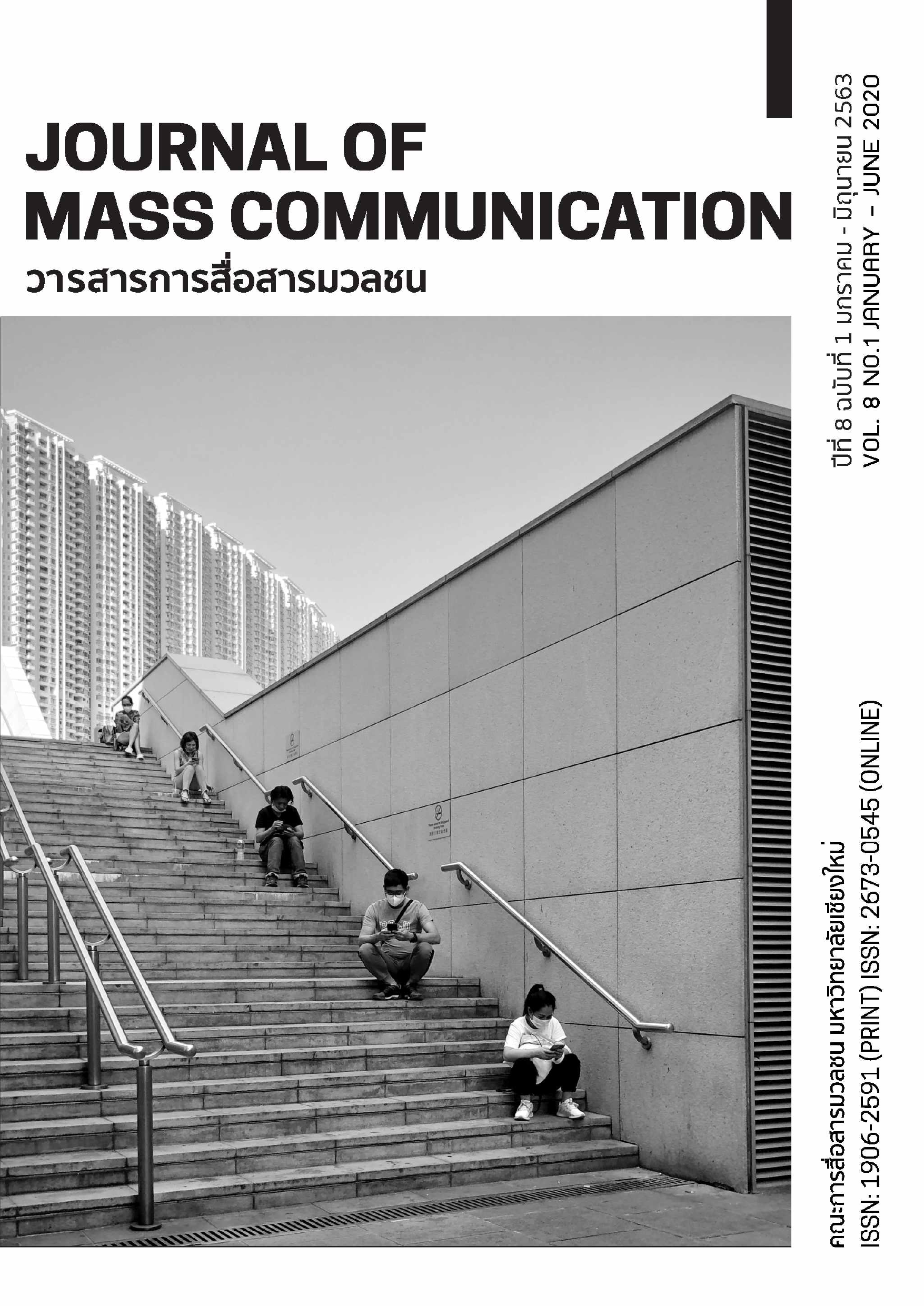โครงการนำร่องการพัฒนาสื่อการละครถกแถลงเชิงสร้างสรรค์เพื่อรณรงค์และป้องกันปัญหาการพนันในเยาวชนและชุมชนในภาคอีสาน
Main Article Content
บทคัดย่อ
งานวิจัยชิ้นนี้เป็นการวิจัยเชิงคุณภาพ มีวัตถุประสงค์เพื่อพัฒนาบทละครถกแถลงด้านการพนันในฐานะสื่อสร้างสรรค์ในการสร้างการเรียนรู้และความตระหนักต่อปัญหาการพนันในกลุ่มเยาวชนและชุมชน ทีมวิจัยใช้แนวทางการวิจัยเชิงปฏิบัติการแบบมีส่วนร่วม (PAR) โดยทำการพัฒนาบทละครถกแถลงเครื่องมือการละครแนว “ละครถกแถลง” เพื่อแสดงและใช้รณรงค์การรู้เท่าทันปัญหาการพนัน และการถอดบทเรียนการทำงานเป็นเครื่องมือในการทำความเข้าใจประสิทธิภาพและประสิทธิผลของเครื่องมือที่ถูกพัฒนาขึ้น รวมถึงการสัมภาษณ์ผู้ที่เกี่ยวข้องเพื่อหาแนวปฏิบัติที่ดีในการส่งเสริมการเรียนรู้เรื่องการพนันและการรู้เท่าทันปัญหาการพนันในพื้นที่จังหวัดร้อยเอ็ด ศรีสะเกษ และอุบลราชธานี
ผลการวิจัยพบว่า ละครถกแถลงเป็นเครื่องมือหนึ่งในการใช้รณรงค์การรู้เท่าทันปัญหาการพนัน โดยเป็นเครื่องมือเฉพาะหน้าที่สามารถทำให้ผู้เข้าร่วมได้มีปฏิสัมพันธ์ในการแสดงความคิดและมีส่วนร่วมในการพูดคุยและเล่าเรื่องได้เป็นอย่างดี นำไปสู่การกระตุกและกระตุ้นความคิดให้ผู้เข้าร่วมได้รู้เท่าทันปัญหาการพนันได้ แต่การรณรงค์ที่เกิดขึ้นเพียงชั่วครั้งชั่วคราวจะไม่สามารถเป็นเครื่องมือในการแก้ไขปัญหาในระยะยาวได้ อย่างไรก็ดี ในฐานะที่ละครถกแถลงเป็นเครื่องมือที่เน้นให้เห็นการเปลี่ยนแปลงของผู้เล่นเป็นสำคัญนั้น ความเปลี่ยนแปลงที่นักแสดงได้สะท้อนจากการเข้าร่วมกระบวนการละครคือการเปลี่ยนมุมมองและองค์ความรู้ต่อการเล่นพนัน โดยเฉพาะความรู้และความตระหนักรู้ในมิติความถูกต้องตามหลักศีลธรรม ถูกใจ กับถูกกฎหมาย แต่อาจจะไม่ได้เปลี่ยนพฤติกรรมของผู้เข้าร่วมที่ตนเองสัมพันธ์กับการพนันโดยตัดขาดอย่างสิ้นเชิงได้อย่างทันท่วงที แต่การที่ผู้ชมซึ่งมีทั้งชาวบ้าน นักเรียน และ นักศึกษา มีจินตนาการร่วมระหว่างชมละครรวมทั้งได้เข้าร่วมถกเถียงแลกเปลี่ยนกันภายหลังการรับชมละครจบลง สามารถสร้างปฏิสัมพันธ์ กระตุกกระตุ้นความคิด และเกิดการแลกเปลี่ยนเกี่ยวกับปัญหาจากการพนัน การรู้เท่าทันการพนัน โดยเชื่อมโยงกับประสบการณ์ของผู้ชมเกี่ยวกับการพนันได้เป็นอย่างดี
Article Details
ลิขสิทธ์ที่ผู้เขียนบทความต้องยอมรับ
เอกสารอ้างอิง
Prendergast, M. and Juliana Saxt. (2009). Applied Theatre: International Case
Studies and Challenges for Practice. Bristol. Intellect.
Shu, Jack. (2018). Forum theatre by ex-gambling addicts – the Chinese family. NJ Drama Australia Journal. 42 (1). https://www.tandfonline.com/eprint/fAVQJDFusXSqr3M9 qmrq/full
กนกวรรณ มะโนรมย์, ปิ่นวดี ศรีสุพรรณ, และ วัชรี ศรีคำ. (2561). วิถีพนันวัยใส: กรณีศึกษาเด็กและเยาวชนที่ถูกจับกุมด้วยคดีพนันในภาคอีสาน. กรุงเทพฯ: ศูนย์ศึกษาปัญหาการพนัน คณะเศรษฐศาสตร์ จุฬาลงกรณ์มหาวิทยาลัย.
กล่มมะขามป้อม. (ม.ป.ผ.). ละครถกแถลง. https://makhampom.org/our-work/theatre-program/
กฤศณัฏฐ์ ดิลกศิริธนภัทร์ และ ปรารถนา คงสำราญ. (2562). การวิเคราะห์กระบวนการในการทำละครของกลุ่มทำละครเพื่อการศึกษา. วารสารสถาบันวัฒนธรรมและศิลปะ มหาวิทยาลัยศรีนครินทรวิโรฒ. 152-161.
พฤหัส พหลหุลบุตร. (2558, 8 เมษายน). Dialogue Theatre ละครถกแถลง. สืบค้นจากhttps://www.facebook.com/notes/10152789044800172/?__xts__[0]=68.ARDmRLy6VZvtzy_Cdv1bL4LMSl6NL0EAA-RV9cZnBzScjWX53Mg8sApEiFqFqlTDfIGNMx4hpthZo0-r5ybHt8wjDlkt6pR5djPUvdudKV8aKEVUpyAjeQ1Vl9_rQM8_jcjuaVG_d0QRhi2uf2lKX7y3fYYygZE2g9lz2fG90XofNWCr3FxwrVsE-LiCnceYrL7yCZ2vjimscJvDanwvwDyzliPbP03HwF_yWnWRPj74GHeiMSD6_XJPhBV213g3EPoXhTdUeX1A5fuVSnwWMK7sDt5jvB8F4NTfaZeKfz9zAvIVDZPf1ltZpCK3KmluogT1n4Y1JnxDunwiayAcPj7O&__tn__=H-R
มูลนิธิสื่อชาวบ้าน (มะขามป้อม). (2562). เอกสารประกอบการบรรยาย หัวข้อ “ละครถกแถลง”. (อัดสำเนา)
วิจารณ์ พานิช. (2558). เรียนรู้สู่การเปลี่ยนแปลง. กรุงเทพฯ: มูลนิธิสยามกัมมาจล.
ศิริพร ยอดกมลศาสตร์. (2555). การพนันในสังคมไทย. จุลสารทันเกม 1 (1): 6-11.
ศูนย์ศึกษาปัญหาการพนัน. (2561). ผลสำรวจสถานการณ์การพนันกลุ่มเยาวชนปี 2560. (เอกสารเผยแพร่)
ออกัสโต บูอาล. (2561). การละครของผู้ถูกกดขี่. (ภินท์ ภารดาม, แปล). กรุงเทพ: สวนเงินมีมา.


